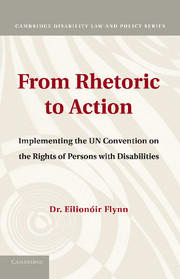Book contents
- Frontmatter
- Contents
- Foreword
- Acknowledgments
- Abbreviations
- Introduction and Methodology
- 1 Comparative International Trends in Disability Law and Policy
- 2 Regional Perspectives on Disability Strategies and Action Plans
- 3 Comparative Country Evaluation
- 4 Critical Success Factors in Delivering a National Disability Strategy ??? Lessons from International and Comparative Experience
- 5 Identifying the Golden Threads in Irish Disability Law and Policy
- 6 Achieving Ireland???s National Disability Strategy ??? A Case Study in Implementation and Monitoring at the Domestic Level
- 7 Showcasing Domestic Progress and Achieving International Standards
- 8 Structural Ingredients for Furthering National Disability Strategies
- 9 Measuring Progress in Achieving Aims of National Disability Strategies ??? Key Success Factors
- Conclusion and Recommendations for Reform
- Index
- References
4 - Critical Success Factors in Delivering a National Disability Strategy ??? Lessons from International and Comparative Experience
Published online by Cambridge University Press: 07 September 2011
- Frontmatter
- Contents
- Foreword
- Acknowledgments
- Abbreviations
- Introduction and Methodology
- 1 Comparative International Trends in Disability Law and Policy
- 2 Regional Perspectives on Disability Strategies and Action Plans
- 3 Comparative Country Evaluation
- 4 Critical Success Factors in Delivering a National Disability Strategy ??? Lessons from International and Comparative Experience
- 5 Identifying the Golden Threads in Irish Disability Law and Policy
- 6 Achieving Ireland???s National Disability Strategy ??? A Case Study in Implementation and Monitoring at the Domestic Level
- 7 Showcasing Domestic Progress and Achieving International Standards
- 8 Structural Ingredients for Furthering National Disability Strategies
- 9 Measuring Progress in Achieving Aims of National Disability Strategies ??? Key Success Factors
- Conclusion and Recommendations for Reform
- Index
- References
Summary
Introduction
Throughout the comparative study conducted in the previous chapter, a number of success factors can be identified by independent evaluation (supported by literature on new public management and community development) as vital to secure successful implementation of a national disability strategy. Although not all of these success factors were present in all of the countries examined, failure to fulfill some of the success factors discussed were sometimes identified as barriers to effective implementation. These factors were key in the selection of the countries examined in the previous chapter and guided the research process to identify the strengths and weaknesses of each national disability strategy. This chapter will identify examples of best practice in achieving each of these aims and will also highlight where failure to address a particular criterion has caused problems for implementation and monitoring. The examples of best practice are primarily taken from the comparative jurisdictions discussed in the previous chapter, but where relevant, a small number of examples (particularly relating to external review and independent monitoring) may be highlighted from countries and jurisdictions not previously considered on the basis that they do not have comprehensive national disability strategies. These examples are included on the basis that best practice in external review or independent monitoring can be found in domestic efforts to implement the CRPD or to review existing legislation, even where a national disability strategy has not been developed. All of the examples highlighted in this chapter are purely illustrative, and do not represent a complete list of international best practice in this area. Rather, they aim to provide a snapshot of positive innovations undertaken that can inform future policy development at the domestic level.
- Type
- Chapter
- Information
- From Rhetoric to ActionImplementing the UN Convention on the Rights of Persons with Disabilities, pp. 197 - 286Publisher: Cambridge University PressPrint publication year: 2011



